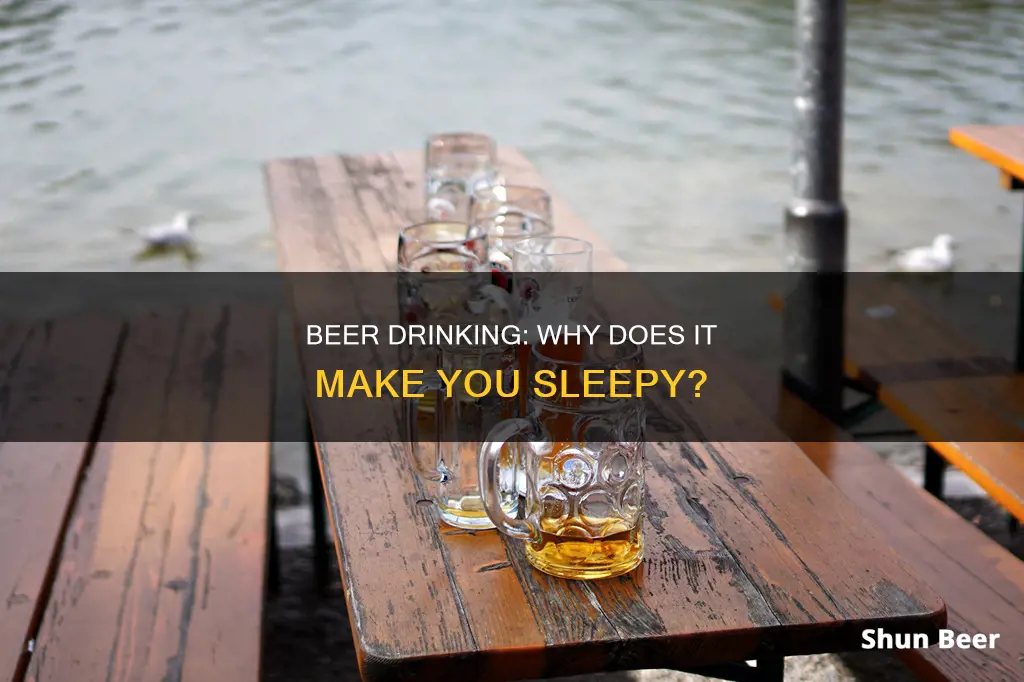
Alcohol is a central nervous system depressant that acts as a sedative, slowing brain activity and causing drowsiness. While it can help you fall asleep faster, it also disrupts your sleep cycle, affecting your sleep quality. This is why you may feel tired after drinking beer or other alcoholic beverages.
| Characteristics | Values |
|---|---|
| Alcohol acting as a sedative | Slowing brain activity and causing drowsiness |
| Alcohol's impact on stress hormones | Raising stress hormones like epinephrine, which increases heart rate |
| Dehydration | Alcohol is a diuretic, increasing urine production and causing dehydration |
| Impact on REM sleep | Preventing REM sleep, which is needed for restorative rest |
| Circadian rhythm disruption | Interfering with the sleep/wake cycle and serotonin production |
| Nutrient absorption | Inhibiting the absorption of vitamins and minerals, such as Vitamin B12 and folic acid |
| Blood sugar impact | Causing fluctuations in blood sugar levels, potentially leading to hypoglycaemia |
What You'll Learn
- Alcohol suppresses melatonin, which regulates the sleep cycle
- Alcohol raises stress hormones, stimulating the body and increasing heart rate
- Alcohol relaxes throat muscles, worsening sleep-related breathing problems
- Alcohol causes dehydration, which can trigger headaches and impact sleep
- Alcohol impairs blood sugar, potentially leading to hypoglycaemia

Alcohol suppresses melatonin, which regulates the sleep cycle
Alcohol suppresses melatonin, which is a hormone produced at night that plays a key role in adjusting your body clock and helping you feel sleepy. Melatonin works in tandem with serotonin, a neurotransmitter that controls the sleep-wake cycle and is produced during REM sleep.
When you drink alcohol, it enters your bloodstream and quickly crosses the blood-brain barrier, affecting brain cells or neurons. Alcohol targets GABA-A receptors, which are present on most neurons. These receptors are usually the destination for GABA (gamma-aminobutyric acid), a neurotransmitter or chemical messenger. Typically, when GABA binds to these receptors, it opens a channel for chloride ions to move inside the neurons. The entry of chloride ions acts like a light switch dimmer, slowing down the neuron's firing. This reduction in neuronal firing causes relaxation, sedation, and sleepiness.
However, after a few hours, the alcohol molecules in the brain cause the GABA-A receptors to lose sensitivity to both alcohol and GABA. The receptors move from the surface of the neuron to its inside, where they are degraded. This process is called receptor trafficking. Without these receptors, the neurons get excited, firing faster than usual, which can wake you up.
Additionally, alcohol interferes with your circadian rhythm or sleep-wake cycle. Regular alcohol consumption lowers serotonin levels in the brain, and low serotonin is linked to poor sleep and low mood. Disrupting this cycle can affect your concentration, focus, mood, and more.
While alcohol can make you fall asleep faster, it does not guarantee a good night's rest. It can negatively impact your sleep quality, leaving you feeling tired the next day.
Exploring the Beer Choices of Vietnam
You may want to see also

Alcohol raises stress hormones, stimulating the body and increasing heart rate
Alcohol is a sedative that slows down brain activity, causing drowsiness. However, after a few hours, it raises the body's level of stress hormones, stimulating the body and disrupting sleep.
Several hours after drinking alcohol, the body experiences an increase in epinephrine, a stress hormone that increases heart rate and stimulates the body. This can result in nighttime awakenings, contributing to insomnia. The stimulating effect of epinephrine counteracts the initial sedative effect of alcohol, leaving an individual feeling tired the next day.
Research has shown that alcohol consumption increases the body's production of cortisol, a primary stress hormone. High cortisol levels are associated with high alcohol consumption, and alcoholics have been found to have higher cortisol levels than non-alcoholics. This increase in cortisol levels can be attributed to the disregulation of the hypothalamic-pituitary-adrenal (HPA) axis, which mediates the impact of stressors on the body.
Chronic exposure to high cortisol levels can have detrimental effects on the body's processes, increasing the risk of health issues such as high blood pressure, diabetes, weight gain, cardiovascular disease, gastrointestinal problems, poor immunity, fatigue, and fertility problems. Additionally, high cortisol levels can cause accelerated neural degeneration during aging and impair the immune system.
The stimulating effect of increased stress hormones, such as epinephrine and cortisol, can disrupt sleep and leave individuals feeling tired the next day, even after a full night's sleep. This is why drinking alcohol, especially in excess, can lead to feelings of fatigue and tiredness.
Beer Consumption After Gastric Lap Band Surgery
You may want to see also

Alcohol relaxes throat muscles, worsening sleep-related breathing problems
Alcohol relaxes the throat muscles, which can worsen sleep-related breathing problems and contribute to sleep apnea. This is because alcohol relaxes the muscles in the airway, causing obstructions in the upper airway that can lead to sleep apnea.
Sleep apnea is a sleep disorder that causes breathing to stop and start repeatedly during sleep. It causes loud snoring, with occasional gasping, choking, or snorting sounds. It can also lead to daytime sleepiness and low energy. Obstructive sleep apnea (OSA) is the most common type, occurring when soft tissues in the back of the throat collapse, causing airway blockages.
When the throat and mouth muscles relax due to alcohol consumption, they are no longer keeping the airway open and clear. Instead, they slightly block the airway, causing respiratory resistance. This means that air has to be forced through the narrowed passages, resulting in the snoring sound. Alcohol can also cause nasal congestion, making it even harder to breathe through the nose.
The more alcohol is consumed, the more relaxed the tissues and muscles become, and the louder the snoring. Even a tiny amount of alcohol can impact sleep and cause snoring. Therefore, if you want to get a good night's sleep, it is best to skip the alcohol and opt for a non-alcoholic beverage instead.
Beer and Low FODMAP Diet: What's the Verdict?
You may want to see also

Alcohol causes dehydration, which can trigger headaches and impact sleep
Alcohol is a diuretic, which means it increases urination and can lead to dehydration. Dehydration can cause headaches and impact sleep quality.
Dehydration is a common side effect of drinking alcohol. Alcohol is a diuretic, which means it increases urine production and can lead to dehydration if not countered with adequate water intake. Dehydration can have several negative consequences for the body, including headaches and impaired sleep quality.
Firstly, dehydration can be a trigger for headaches, including migraines and tension headaches. While the exact mechanism is not fully understood, research suggests that dehydration may play a role in the development of these types of headaches. For individuals prone to migraines, alcohol can further increase the likelihood of an attack. In addition to dehydration, alcohol contains histamine and congeners, which are also linked to triggering headaches.
Secondly, dehydration can impact sleep quality. Sleep is essential for the body to recover and repair, and dehydration can disrupt this process. Alcohol already interferes with the sleep/wake cycle by suppressing melatonin and reducing REM sleep. Dehydration compounds this issue, further diminishing sleep quality.
To mitigate the effects of dehydration, it is important to stay hydrated, especially when consuming alcohol. Drinking water or electrolyte solutions can help counteract the diuretic effects of alcohol and reduce the likelihood of experiencing dehydration-related headaches and sleep disturbances.
In summary, alcohol causes dehydration, which can trigger headaches and impact sleep quality. The diuretic effects of alcohol can lead to dehydration, and this dehydration can contribute to headaches and impaired sleep. Staying hydrated is a key strategy to counteract these negative consequences of alcohol consumption.
Hiding Beer at Work: Creative Disguise Strategies for Employees
You may want to see also

Alcohol impairs blood sugar, potentially leading to hypoglycaemia
Alcohol is known to cause tiredness by acting as a sedative that slows down brain activity and causes drowsiness. However, it can also impair blood sugar control, potentially leading to hypoglycaemia, especially in individuals with diabetes. Here's how:
The liver plays a crucial role in maintaining healthy blood sugar levels by storing and producing glucose. It relies on signals from hormones like insulin to know how much glucose the body needs. When we consume alcohol, the liver's primary function shifts from regulating blood sugar to detoxifying the body of alcohol. As the liver works to break down alcohol, it may not release enough glucose to keep blood sugar levels stable. This disruption in glucose production can be particularly problematic for people with diabetes who take insulin or medications that increase insulin production. Insulin lowers blood sugar levels, so when the liver produces less glucose, the additional insulin can cause blood sugar levels to drop too low, resulting in hypoglycaemia.
The risk of alcohol-induced hypoglycaemia is higher when drinking on an empty stomach or when blood sugar levels are already low. Additionally, alcohol can continue to affect the body and liver for several hours after consumption, increasing the likelihood of experiencing hypoglycaemia overnight if drinking before sleep.
Symptoms of hypoglycaemia can include sweating, weakness, shakiness, nervousness, increased heart rate, seizures, or even coma in severe cases. It is crucial to monitor blood sugar levels and take immediate action to raise them when symptoms of hypoglycaemia occur.
Furthermore, certain types of alcoholic beverages, such as traditional cocktails, cream liqueurs, and dessert wines, tend to be higher in carbohydrates and sugars. Consuming these drinks may lead to higher blood sugar spikes compared to light beers, red and white wines, or distilled spirits.
While hypoglycaemia is more commonly associated with individuals who have diabetes, it is important to note that alcohol can also cause lower blood sugar levels in people without diabetes, although it is rare for them to experience hypoglycaemia.
Beer After Blood Donation: What's the Verdict?
You may want to see also
Frequently asked questions
Alcohol acts as a sedative, slowing down brain activity and causing drowsiness. However, after a few hours, it raises stress hormones and increases your heart rate, disrupting your sleep.
Drinking beer can cause you to wake up throughout the night, impacting the quality of your sleep. It suppresses melatonin and reduces REM sleep, which is the deepest stage of sleep that helps with memory and concentration.
To avoid feeling tired, it is recommended to drink in moderation, stay hydrated, and consider supplements to help your body process alcohol. It is also important to give your body enough time to process the alcohol before going to sleep.







